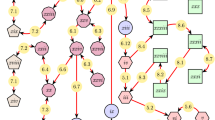Abstract
Explicit convergence rates in geometric and strong ergodicity for denumerable discrete time Markov chains with general reversible transition matrices are obtained in terms of the geometric moments or uniform moments of the hitting times to a fixed point. Another way by Lyapunov’s drift conditions is also used to derive these convergence rates. As a typical example, the discrete time birth-death process (random walk) is studied and the explicit criteria for geometric ergodicity are presented.
Similar content being viewed by others
References
Baxendale P. Renewal theory and computable convergence rates for geometrically ergodic Markov chains. Ann Appl Probab, 2005, 15: 700–738
Chen M F. Equivalence of exponential ergodicity and L 2-exponential convergence for Markov chains. Stoch Proc Appl, 2000, 87, 281–297
Chen M F. Explicit bounds of the first eigenvalue. Sci China Ser A, 2000, 43: 1051–1059
Chen M F. From Markov Chains to Non-Equilibrium Particle Systems, 2nd ed. Singapore: Word Scientific, 2004
Chen M F. Eigenvalues Inequalities and Ergodic Theory. New York: Springer-Verlag, 2005
van Doorn E A, Schrijne P. Analysis of random walks using orthogonal polynomials. J Comput Appl Math, 2000, 99: 387–399
Gulati C M, Hill J M. A note on an alternative derivation of random walk probabilities. Sankhya Ser A, 1981, 43: 379–383
Hou Z T, Guo Q F. Homogeneous Denumerable Markov Processes. Beijing: Science Press, 1978
Mao Y H. Convergence rates in strong ergodicity for Markov processes. Stoch Proc Appl, 2006, 116: 1964–1976
Mao Y H, Zhang W Y. Some results on ergodicity for Markov chains (in Chinese). J Beijing Normal Univ (Sci Ed), 2004, 40: 437–440
Mao Y H, Zhang Y H. Exponential ergodicity for single birth processes. J Appl Probab, 2004, 41: 1022–1032
Meyn S, Tweedie R L. Markov Chains and Stochastic Stability. London: Springer-Verlag, 1993
Roberts G O, Tweedie R L. Geometric L 2 and L 1 convergence are equivalent for reversible Markov chains. J Appl Probab, 2001, 38: 37–41
Sokal A D, Thomas L E. Exponential convergence to equilibrium for a class of random-walk models. J Stat Phys, 1989, 54: 797–828
Yosida K. Functional Analysis, 6th ed. New York: Springer-Verlag, 1980
Author information
Authors and Affiliations
Corresponding author
Rights and permissions
About this article
Cite this article
Mao, YH. Convergence rates for reversible Markov chains without the assumption of nonnegative definite matrices. Sci. China Math. 53, 1979–1988 (2010). https://doi.org/10.1007/s11425-010-3139-z
Received:
Accepted:
Published:
Issue Date:
DOI: https://doi.org/10.1007/s11425-010-3139-z
Keywords
- Markov chain
- spectral theory
- convergence rate
- geometric ergodicity
- strong ergodicity
- Lyapunov’s condition



